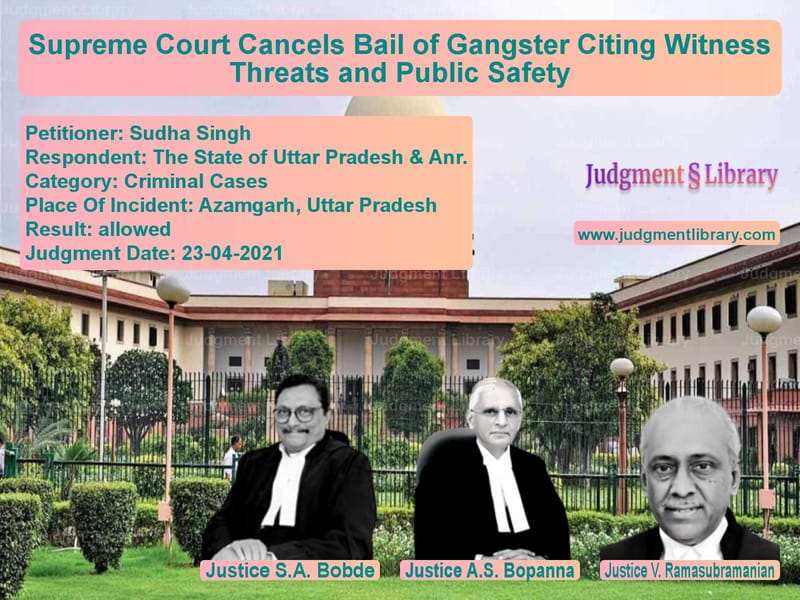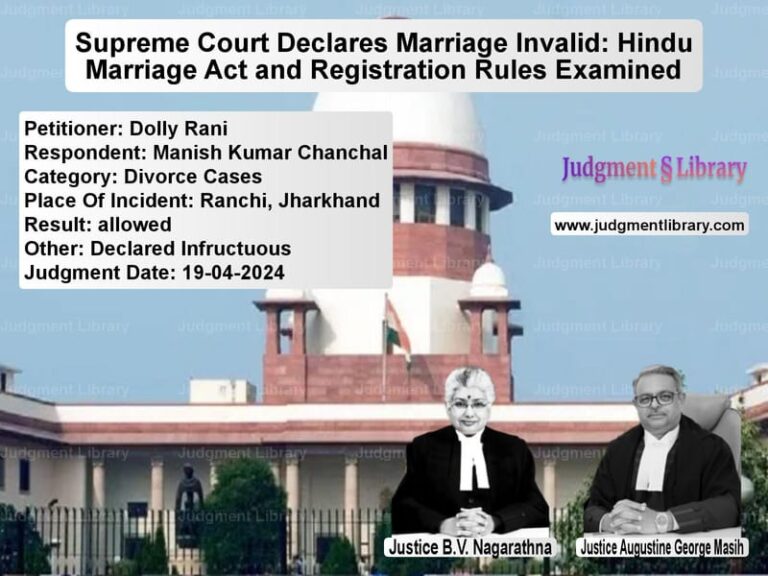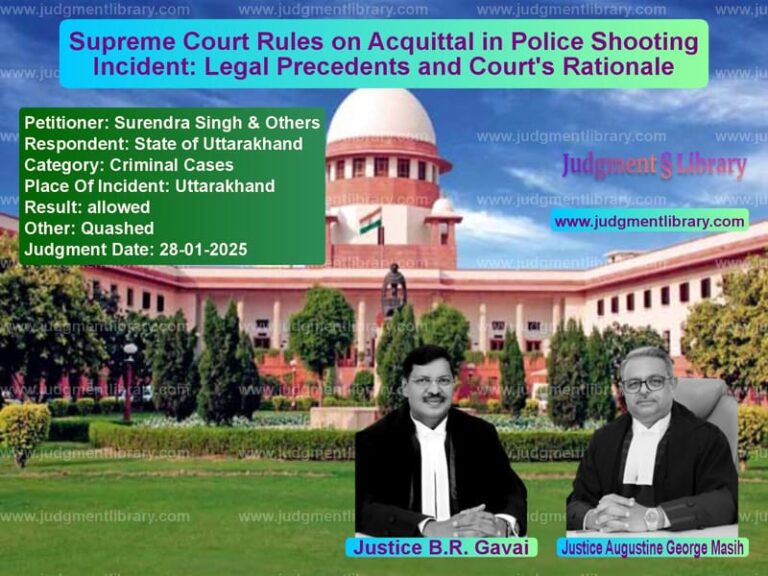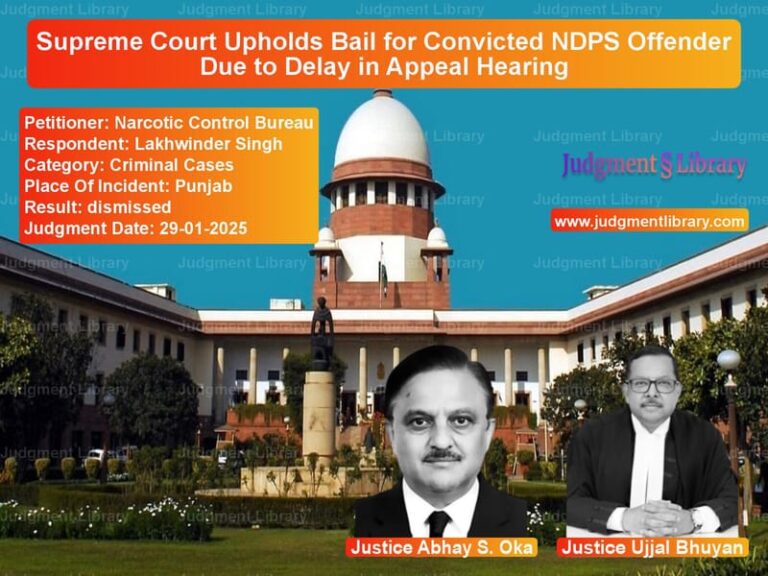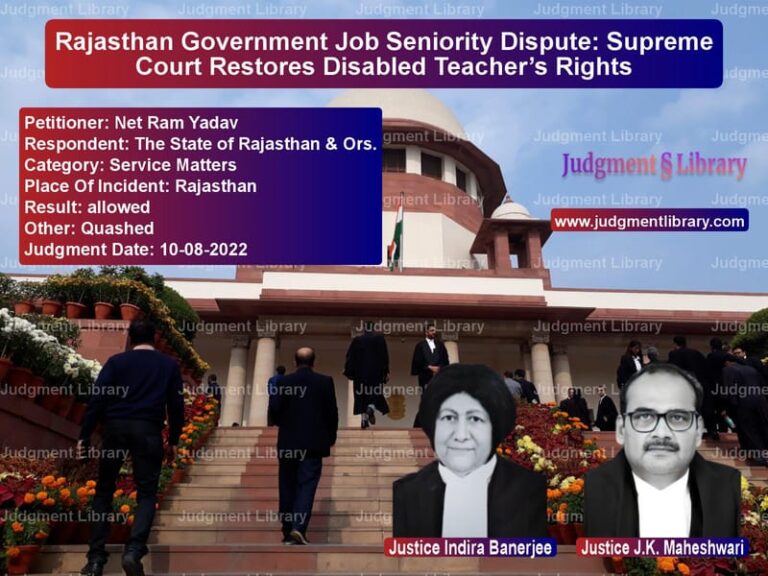Supreme Court Cancels Bail of Gangster Citing Witness Threats and Public Safety
The Supreme Court of India, in the case of Sudha Singh v. The State of Uttar Pradesh & Anr., set aside the bail granted by the Allahabad High Court to an accused gangster, citing serious concerns over public safety and the protection of witnesses. The ruling underscores the judiciary’s responsibility to balance personal liberty with public security and the proper conduct of criminal trials.
Background of the Case
The appellant, Sudha Singh, is the wife of the deceased victim, Rajnarain Singh, who was allegedly murdered by the accused, referred to as Respondent No. 2, in a planned conspiracy. A First Information Report (FIR) was filed under Case Crime Number 200 of 2015 at P.S.-Sodhari, District Azamgarh, Uttar Pradesh. The charges framed against the accused included Sections 120-B (Criminal Conspiracy) and 302 (Murder) of the Indian Penal Code (IPC) and Sections 3 and 25 of the Arms Act, 1959.
The accused was identified as a contract killer and sharpshooter, having a criminal history involving at least 15 prior cases of serious offenses such as murder, attempted murder, and criminal conspiracy.
Key Issues Raised
- Whether the Allahabad High Court erred in granting bail to an accused with a history of violent crimes.
- Whether the release of the accused posed a potential threat to witnesses and the victim’s family.
- Whether the conduct of the accused during the trial justified bail cancellation.
- Whether granting bail in such cases undermines public confidence in the criminal justice system.
Arguments by the Appellant (Sudha Singh)
- “The accused is a known gangster and a history-sheeter involved in multiple serious crimes, making him a danger to society.”
- “During the trial, the accused engaged in non-cooperation, threatened witnesses, and manipulated court proceedings to delay justice.”
- “The Sessions Court had to order security for witnesses due to the accused’s intimidation tactics, highlighting the risk of allowing him bail.”
- “The accused, if released, will continue his criminal activities, endangering witnesses and obstructing justice.”
Arguments by the Respondent (Accused and State of Uttar Pradesh)
- “Bail was granted on liberal terms, and the accused has a constitutional right to liberty under Article 21.”
- “The accused has been incarcerated for a significant period, and further detention violates his right to a fair trial.”
- “No concrete evidence suggests that the accused will threaten witnesses or abscond.”
- “Bail conditions imposed by the High Court were sufficient to prevent any misuse of liberty.”
Supreme Court’s Observations and Ruling
1. High Court’s Failure to Consider Criminal Antecedents
- “The High Court overlooked the accused’s extensive criminal record, which included multiple offenses under Chapters 16, 17, and 22 of the IPC.”
- “A history-sheeter with a demonstrated pattern of violent crime should not be granted bail on liberal terms.”
2. Threats to Witnesses and Fair Trial
- “The accused’s conduct during the trial, including threats to witnesses and deliberate delay tactics, warranted a stricter approach from the judiciary.”
- “The Sessions Court was compelled to provide security in court and to witnesses, indicating a credible threat.”
3. Role of Judiciary in Preventing Organized Crime
- “Courts must exercise greater caution when granting bail to known gangsters, particularly those engaged in contract killings.”
- “Public confidence in the criminal justice system is undermined when dangerous criminals are released on bail despite overwhelming evidence of their threat to society.”
4. Application of Supreme Court Precedents
- “In Neeru Yadav v. State of U.P., the Court held that High Courts must carefully scrutinize an accused’s criminal record before granting bail.”
- “In Prasanta Kumar Sarkar v. Ashis Chatterjee, it was established that bail must be granted cautiously when dealing with serious offenses, considering factors such as prior criminal history, severity of punishment, and likelihood of repetition.”
Supreme Court’s Judgment
The Supreme Court ruled as follows:
- The order of the Allahabad High Court granting bail to the accused is set aside.
- The accused shall be taken into custody immediately.
- The trial court is directed to expedite the hearing and conclude the trial at the earliest.
- Witnesses shall continue to receive necessary security and protection.
Key Takeaways from the Judgment
- Courts must exercise caution in granting bail: The Supreme Court emphasized that bail should not be granted liberally to hardened criminals.
- Protection of witnesses is crucial: The accused’s history of intimidation warranted judicial intervention to ensure witness safety.
- Judicial responsibility in organized crime cases: The Court stressed the importance of preventing history-sheeters from misusing bail provisions.
- Precedents reinforcing strict bail considerations: Prior judgments affirm that serious criminals should not be granted bail without thorough examination of all risks.
Conclusion
The Supreme Court’s ruling in Sudha Singh v. The State of Uttar Pradesh & Anr. is a landmark decision reaffirming that public safety and fair trial principles must take precedence over the personal liberty of hardened criminals. The judgment highlights the need for judicial vigilance in cases involving gangsters and contract killers, ensuring that justice is not obstructed by procedural leniency.
Petitioner Name: Sudha Singh.Respondent Name: The State of Uttar Pradesh & Anr..Judgment By: Justice S.A. Bobde, Justice A.S. Bopanna, Justice V. Ramasubramanian.Place Of Incident: Azamgarh, Uttar Pradesh.Judgment Date: 23-04-2021.
Don’t miss out on the full details! Download the complete judgment in PDF format below and gain valuable insights instantly!
Download Judgment: sudha-singh-vs-the-state-of-uttar-p-supreme-court-of-india-judgment-dated-23-04-2021.pdf
Directly Download Judgment: Directly download this Judgment
See all petitions in Bail and Anticipatory Bail
See all petitions in Custodial Deaths and Police Misconduct
See all petitions in Judgment by S. A. Bobde
See all petitions in Judgment by A. S. Bopanna
See all petitions in Judgment by V. Ramasubramanian
See all petitions in allowed
See all petitions in supreme court of India judgments April 2021
See all petitions in 2021 judgments
See all posts in Criminal Cases Category
See all allowed petitions in Criminal Cases Category
See all Dismissed petitions in Criminal Cases Category
See all partially allowed petitions in Criminal Cases Category

